Recent Blog Posts
Pizza Pasta
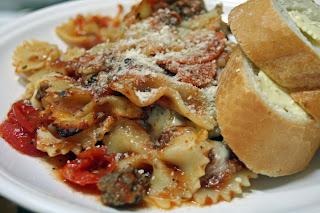
2 C uncooked pasta (penne, rotini, farafalle...)
1 T olive oil
1 lb Seasoned Sausage
1 onion, diced
2 cloves garlic, minced
2 C cherry tomatoes, cut in half
2 C spaghetti sauce, homemade or jarred :)
1 C shredded mozzarella
Parmesan cheese for topping
1. In pot, bring water to boil and cook pasta until al dente.
2. In large skillet, brown sausage and drain.
3. In same skillet, saute onions for 1 minute on medium heat, then add garlic.
4. return meat to skillet and add tomatoes, drained pasta and spaghetti sauce.
5. Allow sauce to get up to temp, then turn off burner and add mozzeralla cheese. Stir, then serve while hot with bread and butter!
Top with shredded parmesan! (And crushed red pepper if you have it!)
Optional additional add ins:
Black olives (you can find at homeplus)
mushrooms
bell pepper
spinach
1 C pepperoni ( nicedeli.com)
*This is great for a quick dinner and makes for good leftovers. :)
Courtesy Lindsey Lett
Random pictures, part 42
Yet another random pictures post comin’ at you! These are the photos that didn’t make it into another post, but were too good to keep to myself.
Association? Asocation? Assicition? Assocation? Ah, assocition! Got it!
Seriously, do the people that buy signs ever use spell-check?
OK, ladies, does the size of the ring really matter? More importantly, is it worth the time and trouble of the plastic surgery for that bigger rock? I do like how almost everything is in English… Seen at Sinchon subway station.
The public bike system in Suwon seems to be working… except for those darn electronic locks. With several months worth of dust and no sign that these things are being used at all, I wonder how much taxpayer money went into this program… Seen near Hwaseong Palace.
Oh, dear. Some things just don’t belong in the men’s room, including these shocked-looking faces above the urinals. Seen at Dongtan’s Metapolis.
OK, class, today we’re going to build a spaceship! Sounds like a fun class to me. Seen in Ulsan.
Because we all know Lassie is a WILD animal. Seen at a Daiso.
 © Chris Backe – 2011
© Chris Backe – 2011
This work is licensed under a Creative Commons Attribution-NonCommercial-ShareAlike 3.0 Unported License.
This post was originally published on my blog, Chris in South Korea. If you are reading this on another website and there is no linkback or credit given, you are reading an UNAUTHORIZED FEED.
Jinhae's Cherry Blossom Festival
Korea is a country that loves a good festival. These range from the beauty of Jinhae's Cherry Blossom Festival or the dazzling lights of Jinju's Lantern Festival; to the charming cultural ones such as Gwangju's Kimchi Festival or Jindo's Moses Walk; to the downright weird such as Cheongsando's 'Slow Walking Festival'.
Oh, and the epicness that is the Mud Festival.
While the cold weather and work dramas have meant my touring of Korea has been limited so far, the sudden (and much welcomed) warm change and finally having some money in my wallet has allowed me to get out of Busan and see a corner of Korea that doesn't hold my girlfriend's apartment. While I'll admit to not having the hugest interest in cherry blossoms, I was looking forward to getting out and seeing something new.
Kimberly and I left Busan at 9.30 and, after the fifty minute subway ride out to Nopo's bus terminal, grabbed a late breakfast from Paris Baguette. We even splashed out on a cherry donut in honor of the day's festivities. Our 11.20 bus to Jinhae never did show up, but when an 11.40 bus arrived we eagerly clambered aboard. While Kimberly wrestled with her luggage, the bus driver assured us that this was the bus to Jinhae. You can imagine our surprise then when the bus stopped and emptied out in the city of Masan - a good forty kilometers north of Jinhae.
A very stressed Kimberly put in a call to the rest of our companions, a large group of public school teachers who had rented vans for the drive down from Daejeon. Thankfully (?) they had run into atrocious traffic and we weren't holding them up in any way, so we quickly flagged a cab and forked over the 15,000 won ($15) that would take us to Jinhae. The bus might have been a cheaper option, but given the traffic and the lines to get on board - we'd probably have been lucky to make it there in time for dinner.
But arrive we did. Thirty minutes of crawling through bumper to bumper traffic highlighted just how popular the festival is and it also gave us some great opportunities to snap photos of the cherry blossom trees lining the roadside. I was quick to swallow my skepticism about the event as I snapped off dozens of photographs of the beautiful trees, the drifting petals, and the hundreds of people gazing about them in wonderment. It's often easy to overlook Korea's natural beauty. It's so artfully hidden behind generic apartment buildings, ugly tangles of power lines, and garbage rotting in the streets that it's a rare thing to stop, take a deep breath, and realize that you're in a truly stunning country.
After being dropped off Kimberly and I began to explore the many booths and food stalls choking the streets. Cherry blossoms might have been the main draw of the festival, but the people seemed more interested in the many products on display and the opportunity to eat street food, play carnival games, and soak in the atmosphere. I don't think I've seen such a large number of foreigners outside of the Mud Festival before either. Hell, there were even fair haired children and German tourists on hand!

Kimberly posing with a flower in her hair. There's photos of me doing the same floating around somewhere...
The Daejeon crew's continued delays meant they didn't get to the festival until around 4pm - by which time Kimberly and I had been robbed blind by an ajoshi reading palms, we'd stuffed ourselves full of sugar and carbs, and we'd posed stupidly for far too many photographs. When the Daejeon crew arrived it was time to make our way down the crowded 'sideshow alley' stretch of the festival. We stopped for delicious vegetable and squid pancakes in one tent (and a few of the more adventurous travelers started in on the soju in earnest) and then took our chances at games ranging from the traditional shooting gallery to a strange game of chance that seemed to rely solely on the whims of fish. Tasteless but colorful candy was bought and stuffed radish toys were won. Good times were had.
With bellies full and the sun beginning to dip below the horizon, the braver amongst us decided to climb the 365 stairs up the mountain that overlooks Jinhae to take in the view from up top. With the city lighting up beneath us and the cherry blossom trees standing out against the increasingly dark skies and scenery, there were plenty of breathtaking photo opportunities before we got to the top. The temptation to not climb another two dozen or so stairs to the top of the tower on the mountain was hard to resist, but any spaghetti legs were totally worth the view from up there.
By the time we weary few returned to the bottom of the mountain it was almost full dark and time for some real food. We piled into the vans and began the ninety minute (thanks to traffic) drive back to Masan where we'd be staying in the pimped out Ice Motel. I've stayed in my fair share of cheap love motels and this one took the cake. Twin PCs in every room, a Wii in one room, jacuzzis in every room, and a fucking stripper pole in the smoker's room! A stripper pole!
After figuring out who would bunk with who and who would have the honor of sleeping on the floor, it was time to head out for food. The logistics of handling a trip for eighteen people had begun to weigh on our fearless leaders, Jon and Sarah, and so we opted for the simple option of McDonalds for dinner followed by a Family Mart run for booze and snacks. Truth be told though, most of us weren't really in a partying mood any more. If Kimberly and I were tired - I dread to think how the Daejeonites were feeling after their six hour drive and 7am starts. Still, good conversation was had over beers before heavy eyelids called an end to proceedings.
We all slept in the following morning and that meant we didn't get a chance to see any more of Jinhae. I hopped a bus back to Busan and the Daejeon crew piled back into their vans praying the ride home wouldn't take six hours. I'm pleased to say it was closer to four.
Whether you're a would-be botanist, a photography nut, or just a sucker for crowds and junk food - the Cherry Blossom Festival is a fun day trip. The night in Masan definitely isn't something you need to do if you just want to soak in the sights, but given how choked the roads to and from Jinhae had been - it might have counted in our favor to avoid the them for an extra twelve hours or so.
For more information you can check out the official site of the festival here or the Korean Tourism website. It's not a must see, but it's a fun day out and a great way to welcome spring.
Got a burning question that you can't fit into one comment? Need to contact me for a travel tip? Feeling generous and want to donate $1,000,000 to my travel fund? Want me to visit your town and tell the world about it?
For all of the above reasons and many more, here are my contact details.
- Skype: CWBush83
- Twitter: CWBush
- MSN: CWBush83 (at) hotmail.com
- Email: CWBush83 (at) gmail.com
Korean Gender Reader
 (“Alice {The Devil’s Bride}” by Stephen Fabian; source)
(“Alice {The Devil’s Bride}” by Stephen Fabian; source)
1) Rape and “Blood Money”
In essential reading for all expats, Ask a Korean! clears up misunderstandings about how and why victims of crimes are often offered the choice of quick financial compensation from perpetrators, rather than the latter automatically being prosecuted by the state. With a lot of pros in practice, unfortunately there are also some big cons in relation to sex crimes specifically:
Probably the biggest flaw is that often, a victim of a crime cannot properly assess the extent of her loss through the crime. If a person is beat up, the person might suffer a lingering damage that does not flare up until the settlement amount was computed. Also, sometimes it is not the victim herself who enters into the settlement. This used to lead to an incredibly outrageous situation in case of child molestation. As noted above, rape is a private crime. Since a child does not have the legal decision-making authority, the parents would handle the private crime process. And often, a molested child would come from a broken home, in which the parent would rather take a lump sum of cash right away rather than ensuring that the child rapist would go to jail. (Fortunately, this situation was redressed in 2008 by a new law that made child molestation a public crime.) Also, the inclusion of rape as a private crime is roundly criticized by many legal scholars, as it puts a burden on the victim to pursue what is a very serious crime that significantly threatens the social order. (To be sure, rape with battery, i.e. a violent case of rape, is a public crime. But, for example, a date rape involving drugs is a private crime.)
2) Non-Asians in Korean Music Videos: A Response
 (Source)
(Source)
3) A Place of Refuge: The Sae Gil Shelter
A very welcome follow up to its February article on the Busan performance of the Vagina Monologues (videos below), BusanHaps has tells us more about the Sae Gil Shelter for victims of domestic violence, which the performances managed to raise 3.4 million won for.
In contrast to most gender-related stories in Korea however, fortunately great strides have been made in combating domestic violence in recent years, primarily due to a 2007 law change that requires police to forward all cases of domestic violence to a prosecutor (the previous 1998 law just left it up to their own discretion). For more details, see here.
(Via: Koreabridge)
4) South Korea Keeps Its Military Ban On Gay Sex
In a 5-4 decision last month, the Constitutional Court ruled that a 39 year-old military law criminally punishing homosexual soldiers for performing sexual acts in military barracks is constitutional. As the AFP reports:
“The legal code cannot be seen as discrimination against gays because such behavior, if left unchecked, might result in subordinates being harassed by superiors in military barracks,” it said in a statement. The law’s purpose was to ensure discipline within the whole military organization, the court said. The ruling came after an army military court filed a petition with the Constitutional Court. It asked whether the military criminal code, written in 1962, was discriminatory against gay soldiers and thus unconstitutional. Homosexuality is not illegal under the civil legal code.”
A somewhat hollow-sounding defense considering overwhelming evidence of systematic and widespread sexual harassment already occurring, as outlined here and here. Also, OnTop Magazine adds that “The Military Penal Code further punishes gay troops by lumping together consensual and non-consensual gay sex as sexual harassment”, and the The Korea Times that ‘offenders’ are also given a dishonorable discharge after leaving jail. This effectively punishes them for life in a society where military service is widely regarded as a de facto requirement for “real” citizenship.
Meanwhile, in other LGBT-related news, gay filmmaker Kim Jho Kwang-soo – only the second man in the entertainment industry to come out of the closet – has announced his marriage (alas, not legally recognized), and I’m No Picasso discusses the unfortunate consequences for one her students of Korean society denying and marginalizing homosexuality.
 (Source: Barry Deutsch)
(Source: Barry Deutsch)
5) International Comparison of Gender and Unpaid Labor
Again for a pleasant change, Korea is only slightly worse than the OECD average for the extra unpaid labor women do compared for men.
Also, for a very interesting new book on the subject that I look forward to buying when it’s available at WhatTheBook? (hint hint), see Shattered: Modern Motherhood and the Illusion of Equality by Rebecca Asher.
6) The Female Writer in Korea
Charles at Korean Modern Literature in Translation on the first chapter of Ideology, Culture, and Han by Younghee Lee. Chapter 2 coming soon!
7) Banned Music Video of the Week: Mirror Mirror (거울거울) by 4Minute (포미닛)
Or at least, the consensus is that one particular dance move in it soon will be. If the song itself is not to your liking, then skip ahead to 2:16.
8) Booking Clubs
Perspectives on Korean and Los Angeles Booking Clubs from Blog in a Tea Cup and Hyphen Magazine respectively.
9) The Jang Ja-yeon Tragedy: Making it all go away
Committing suicide 2 years ago because of forced prostitution by her managers, alleged letters by Jang Ja-yeon (장자연) detailing the string of VIPs, including directors, media executives and CEOs she was forced to have sex with have naturally been getting a lot of attention recently. See The Three Wise Monkeys for the definitive guide to all the latest developments in that case.
10) Cosmetic Surgery on the cheap
GeekinHeels discusses some sort of tape used for creating “V-lines”, while EatYourKimchi tries for same for double-eyelids:
Filed under: Korean Gender Reader Tagged: 4Minute, Dal Shabet, 달샤벳, 거울거울, 포미닛, 장자연, Jang Ja-yeon, Mirror Mirror
Happy Birthday to You and You
That kind of shallow mockery for a birthday party just doesn't cut the mustard at the academy Shane and I teach at here in Busan. On one magical Thursday each month, the kindergarten masses gather for
Seven classes gather in the auditorium and "sit nicely" in "rows". The children who have a birthday that month are corralled in the hallway until they are called one by one to make grand entrances. Once posed in front of all the other kids, they're asked through a chant, what they want to be when they grow up. These 5, 6, and 7 year olds have a much better sense of direction than I did at that age because responses have included singer, artist, business man, driver, dentist, and cowgirl.
After the interviews, classes showcase their talents with a choreographed song and dance number. The song might be a beloved children's song, like Skinamarink or it might just as well be one of ABBA's finest hits. Really adorable.
 Then, when all classes have exhibited their dance prowess, the birthday kids are seated in front and birthday hats are plunked on their heads.
Then, when all classes have exhibited their dance prowess, the birthday kids are seated in front and birthday hats are plunked on their heads. During the last leg of birthday party comes the cake parade. The cakes are store bought, and they are glossy, elaborate, and beautiful, and not as overly sweet as American b-day cakes. We sing happy birthday several times over, long enough for the kiddos to have their picture taken for the personalized yearbooks that will come out at the end of the year. Funny enough, the kids look like they're having fun, until the camera's on them. Then it's all straight faces until the cake is served with lunch.
The children love birthday party, and their excitement usually begins days before the party itself. It's nice to be surrounded with such joy. The power of cake is universal.
Itaewon
But I had to go to Itaewon to buy some south east asian food.
I am currently avoiding seafood, just being on the safe side.
So I donned my home tshirt with jacket and boot.
(Please ignore my messy hair and no make up)
So, What Do You Think about China?
Well, it’s a whole lot more complicated than a one-page or less a week quiz can deal with!
I would identify Taiwan, the Korean peninsula, and Xinjiang as the three territorial issues most likely to affect the PRC’s relations with its Asian neighbors. I think the most important factor that influences Beijing’s relations is its conception of its own territorial integrity and sovereignty. After that, there are two other factors that are less important, defense and economic value. I also think the attitude of its rivals is also important.
Taiwan’s existence strikes right at the core of the PRC’s political and legal sovereignty, is the first line of perimeter defense, and contends with Chinese territorial and economic claims directly. Historically, the only other issue that has superseded Taiwan was the DPRK’s invasion of the ROK in June, 1950. It also involves the United States, and would definitely invite international attention.
The Korean peninsula involves the Koreas, for which their respective conceptions of sovereignty are directly affected. China would have to choose between its economic and security interests, as well as defend its northeastern border. A war on the Korean peninsula would also involve the United States, and also invite international participation.
Xinjiang also involves China’s territorial integrity and affects Beijing’s ability to make claims in Kashmir, Central Asia, and Tibet.
I was impressed by China’s diplomatic efforts with ASEAN regarding the Spratly’s and Paracels, and with India regarding their borders. I also think for all the unfortunate events surrounding its relations with Japan in the East China Sea, that both countries seem to be negotiating their claims. Japan seems to value negotiation over contention, and might perceive more clearly the risks to its own place in the international community or domestic peace of an unpopular conflict. Even if China sees the islands as a defensive perimeter, Taiwan is far more important. I would not rule out an accident involving Daioyu or the Spratly’s creating a security. I think Beijing is willing to negotiate disputes involving economic gains, but refuses to compromise over its conception of its core boundaries and sovereignty.
Hold that Taiwan thought!
I would identify the “five principles of coexistence” and the conception of a harmonious society as the two most significant, if problematic, of Chinese security and foreign policy. I would argue that the apparent conflict between China’s aspirations and pragmatism is a result of a certain notion of the relationship between the state, society, and individuals inherent in Chinese philosophy.
The “five principles of coexistence” give China’s security and foreign policy coherence. In South Asia, Lawrence Saez and Crystal Chang argue that the “rhetoric” of the “five principles of coexistence” has “not changed substantially” and “has regained prominence”. (China, the Developing World, and the New Global Dynamic, Dittmer and Yu, ed., p.87) Dittmer argues that such rhetoric “…is to some degree a performative utterance, encouraging and helping to define a constituency to which it can appeal for support in various international projects requiring international support.” (p. 203) Thomas Kane concludes that observers “…must be cautious about predicting China’s leaders might apply these principles in specific cases. Nevertheless, one should remain aware that the Chinese have such principles and are not likely to abandon them.” (Chinese Foreign Policy in Transition, Liu, p. 112)
In South Asia, China confronts a geostrategic situation in which it shares borders with two adversaries, India and Pakistan. China’s interest in building a warm-water port at Gwadar, Pakistan is an example of the fourth principle, “equality and mutual benefit”. Although India and China co-authored the “five principles”, India provides an example of how China has tried to adhere to the “five principles” and failed, but yet still tries to improve relations, a policy Saez and Chang term “reluctant competition”. In Central Asia, China prefers stability to democratization or Russian dominance, an example of the third principle, non-interference. Yu argues that China’s has also emphasized rhetorically the aspirational rhetoric of the “five principles of coexistence” in its relations with Africa. The Zambia-Tanzania railroad (TAZARA) is an example of mutual benefit. As in Central Asia, China has supported authoritarian regimes, such as Zimbabwe and Angola for mutual benefit and opposed western demands for democratization. In Southeast Asia, Jorn Dosch argues that China-ASEAN relations have created a rough stability mutually advantageous to all parties. (Dittmer and Yu, ed., p. 76)
India and Central Asia strain the idealism of the “five principles” because of the concepts of the state, society, and individuals in Confucian philosophy. Thomas Kane identifies the “hardheaded” approach Chinese leaders take to government power. (Liu, p. 105) Institutions supersede individuals, and government supersedes all other institutions. Defense is one of the state’s two most important duties. In both Central and South Asia, China’s aspirations for Gwadar, oil pipelines, and trade routes conflicts with millennial fears about invasion from the northeastern peoples – that in itself helped to legitimate a stronger state role. A modern example of this fear is the influence of fundamentalist Islamic terrorism upon Uighur separatists in Xinjiang. China tolerates American military action against al-Qaeda and the Taliban. In the end, only a strong Chinese state can guarantee peripheral stability in a region where China must balance commercial openness with security. That security allows China to negotiate more openly in Southeast Asia over secondary sea-based trade routes and to be so generous in Africa where geostrategic concerns are less important than commercial ones.
He really likes those “five principles”!
The People’s Republic of China (PRC)’s defense policy has shown remarkable continuity from its establishment in 1949 to present. The PRC, according to Robert S. Ross, is “neither belligerent nor benign”, and a spoiler that is too weak to be a regional hegemon, but could destabilize the Asian region. (Liu, pp. 141-2) I also found insightful Thomas J. Christensen’s remark, that China is “the high church of realpolitik in the post-Cold War world.” (Liu, p. 59) In this view, China has acted to balance American and Russian policies throughout its history. Finally, Christensen argues that China’s view of “historical legacies and national perceptions” (Liu, p. 62) accounts for any deviation from orthodox balancing behavior.
The first and still most important change in Chinese defense policy arose from 1972 normalization of diplomatic relations between the US and the PRC and the establishment of full diplomatic relations in 1979. The US eventually severed diplomatic relations with Taiwan, allowing for trade relations between the PRC and Taiwan. But China is opposed to Taiwan’s legal independence, and the US supports Taiwan with military hardware. More broadly, the 1972 normalization set up the PRC as a spoiler distinct from Russia. Normalization has facilitated the remarkable burst of diplomatic activity in the 1990s following the fall of the Soviet Union, centered around ASEAN, SCO, FOCAC, and China’s rise as a supplier of peacekeeping forces. But, it has also led to the deployment of missiles aimed at Taiwan, violence in Tibet, frustrations over American policy in Central Asia, and increased defense spending.
Next, in 1991, Russia and the PRC established diplomatic relations through the “Joint Statement on the Basis of Mutual Relations between the People’s Republic of China and the Russian Federation”. China and Russia agreed upon a perspective stressing opposition to what both considered American designs to global hegemony. Since June, 2001, this rapprochement has manifested itself in the Shanghai Cooperation Organization (SCO).
Between 1991 and 2001, the PRC became concerned about Japanese-American relations, because of the Clinton administration’s 1994 pronouncements about its security alliance with Japan. Chinese leadership is divided over Japanese military modernization, theater missile defense, and American withdrawal. Liberals view the US as a restraining influence on Japanese re-militarization and regional hegemony, whereas conservatives fear the US cannot stop Japan from becoming a problem. Subsequently, in 1997, in Washington, the PRC ceased accusing the US of hegemonic designs, stopped arming Iran, and agreed to curtail nuclear proliferation activities. It’s within this context, that the US and China have cooperated over DPRK crises, including hosting multiple rounds of Six-Party Talks.
Sino-American normalization has allowed the PRC both to increase its standing in East Asia, particularly among the ASEAN states, establish a relationship with African states, and foster multilateralism, most prominently through its peacekeeping and UNSC roles. The importance of China’s sovereignty and territorial integrity is manifested in its concerns about Taiwan, Tibet, and Central Asia and its role as an East Asian power by its concern for Japan, the DPRK, ASEAN, and various irredentist claims. This maturing burst of activity requires a modern military and an engaged Chinese state willing to take a long-term, global perspective. As a revisionist power, China has strong memories of invasions, and, as a developing state, China needs to maintain economic growth and its own territorial integrity. I am less fearful of aggression, as much as I am of another crisis concerning the DPRK or some island claim that will involve China with Japan or India.
I just like to shit on every country equally.
The “Taiwan Question” involves the issue of the legal and political identity of the government occupying the island of Taiwan, or Formosa. This issue, as Christensen observes, highlights the limitations of China’s realist perspective on foreign relations. (Liu, p. 65) The “Taiwan Question” highlights instead the importance for China and Taiwan of the memory of humiliation by foreign powers. More fundamentally, the “Taiwan Question” cuts to the core of the legal status of what many Chinese and Taiwanese still consider to be “China”. As for foreign policy, the “Taiwan Question” complicates relations with the U.S, whose own intransigence is another cause for the intractable nature of the situation.
The Dutch, Japanese, and the Chinese during the Ming dynasty have colonized Taiwan, and the story of how the Qing eclipsed the Ming who fled to the island echoes the Chinese Communist Party (CCP)’s claims versus the Guomindang (KMT)’s as Taiwan’s sovereign. The Qing controlled Taiwan from 1683 to 1895, as which point the Japanese annexed Taiwan as stipulated in the Treaty of Shimonoseki ending the Sino-Japanese War. Taiwan became part of the Republic of China in 1945, following Japan’s defeat in World War Two. When, after civil war ended in October, 1949, the KMT lost to the CCP, the KMT fled to Taiwan, causing resentment among indigenous Taiwanese and older generations of Chinese, some of whom favored Japanese rule.
Since October, 1949, the legal status of the mainland and island territories has become a tribute to Confucian traditions of propriety and a matter of bitter diplomatic negotiation and military tensions. This is in no small part because the U.S. refused to recognize the PRC’s legal claim as legal sovereign and instead recognized the ROC on Taiwan. China’s seat on the United Nations and official recognition of China in 1979 resulted in a de jure solution, but de facto, China and Taiwan, as well as the U.S., managed to devise legal dodges, to continue either trading with each other, or even selling military equipment. The elections of an indigenous Taiwanese president, Lee Teng-hui, in 1988, and of a non-KMT president, Chen Shiu-bien, in 2000, has only added layers of convoluted rhetoric and legal vocabulary to the repertoire of all three states.
In the meantime, trade relations between China and Taiwan have deepened from civil war to an official ly recognized free trade agreement, the Economic Cooperation Framework Agreement (ECFA), air and sea links, linked postal services, and exchange of tourists, as well as the existence of an expatriate Taiwanese community in Shanghai. Beijing hopes that the success of Hong Kong and Macau will convince Taiwanese to accept some similar legal arrangement. As of 2010, though, the Taiwanese electorate is divided, with a significant plurality of Taiwanese people favoring Taiwanese independence, ROC independence, or merely the legal status quo. Only a minority favor unification, but are divided into pro-ROC and pro-mainland factions.
Although I think Chinese foreign policy with the non-Asian world has theoretical coherence due to the “five principles of coexistence”, relations with Taiwan are dominated by bitter outbursts, which the U.S.’s Cold War mentality only stokes further. Geostrategically, Taiwan threatens the mainland directly and a theater missile defense pact with Japan would limit China’s defensive perimeter with Japan. Concerning the “Taiwan Question”, William H. Overholt has argued that the “outcome will be determined by leaders, not by inevitable historical processes.” (Overholt, Asia, America, and the Transformation of Geopolitics, p. 154) I would argue that Taiwan will continue as a de jure problem until another de facto crisis, like the Korean War did in 1950, permanently eliminates the need for China and Taiwan to disagree.

Powered by ScribeFire.
Filed under: Academia, Business/Economy, East Asia, Korea, Military, Politics, Southeast Asia, USA Tagged: asean, china, five principles of coexistence, taiwan
Busan e-FM Week 10: 2010 Review
Background
There’s an old saying ‘do someone a favour it becomes your job’. Having shown willing to veer away from the original schedule and do a Christmas segment, then I was asked to do a review of 2010.
Introduction
Now we’ve reached the end of 2010, I thought that today I should do a bit of a review of my latest year in Korea.
But first – the burning issue of my wife’s Christmas present
Right after leaving the station last week I went to the nearby Lotte Department Store here in Centum City – and they were closing it, at 8pm(!), so I couldn’t get in. Maybe it’s a sign that I’ve been in Korea too long, because I’ve started to really believe that stores are open all the time – or at least – really long hours.
My Christmas experience highlights one of my biggest problems in Korea – I can’t really function independently. I actually wanted to buy an Android phone for my wife, but with my limited level of Korean language ability it’s completely impossible. So I made a gift voucher for her instead, saying that I would buy her a phone – but obviously, we’d have to go to the store together after Christmas.
Eventually I spent many hours walking around Nampodong on Christmas Eve trying to find a token present – a snow globe – which my wife really wanted I think, but I didn’t see one – not even a cheap plastic one. I gave up and bought her some tea. I know that doesn’t sound like much but I think it was more expensive by the gram than crack cocaine [this wasn’t a joke] – it wasn’t some kind of 5,000 won box from a mart. Even so, the whole tea-buying experience was still very frustrating. I guess the ajumma was trying to tell me about all the types of teas using body language, which doesn’t really work.
Christmas Day and Babies
Christmas Day was a bit of a write-off. We’d planned to go out for something to eat, but our baby was sick, so he cried almost all day and we had to take care of him. The next day – which is also a British holiday called ‘Boxing Day’ - was better, but then the day after that we had to take him to the hospital. He’s on some medicine now, which unfortunately he keeps throwing up. I’ve been working very long hours in the last few months, so I’d really been looking forward to having a holiday, but it didn’t happen. I suppose that’s the way things are when you have a baby.
But having a baby was one of the highlights of my year. Of course, it’s a huge event in our lives. But it’s also been a really tough experience for me – it’s meant a lot more work and a lot less sleep. He was born in September, but even before that there was quite a lot to do, so it’s really been this year’s biggest theme for me. It’s such a big subject I should probably come in here one week and just talk about the whole fusion baby experience. [Four weeks later, I did.]
These are the toughest times and I’m sure it will get easier as he gets older, but certainly one of the downsides for me has been that because of this we don’t go out much now. So it has changed the nature of my life in Korea. Before he was born I still felt a little like a tourist – going out to lots of places, and having lots of experiences, but since his birth I haven’t been able to get out much, so now it feels like I actually live here.
I work from home, so many days can go by without me even leaving the apartment. The baby also changed my job a lot because my wife is a financial trader like me, so we used to work together, but now I just work alone, and it’s quite a solitary experience.
Busan e-FM
This is one of the reasons I decided to accept the invitation to come on Busan e-FM – I needed to get out more and do something new. And it’s certainly been one of my more memorable experiences of 2010. It’s actually interesting because it’s my first experience of dealing with Korean people professionally, and I think that’s part of the learning process as a foreigner here.
Memories of 2010
When I looked back at my blog I seem to have been to quite a few festivals and performances in the first half of the year. The Haeundae Sand Festival and Dadaepo Beach Kite Festival were quite memorable – I saw snow in Busan for the first time in March, and during the summer we spent a weekend at a friend’s summer house near Daegu, where we helped dig a foundation for a small building, and harvested some of his crop of vegetables.
Then there’s all the things that were happening in Korea – Kim Yu-na skating for gold in Vancouver, the World Cup, and of course the sad things as well – the attacks on the Cheonan and Yeonpyeong Island. It was local news, but the fire at the Golden Suites building in Haeundae was quite shocking too – it really makes you think about living in high-rise apartments in Korea.
And plans for 2011
I usually don’t think about making New Year resolutions, but then every year, once Christmas is over, I have a habit of dwelling over the previous year, and thinking about how to improve things in the next 12 months, so I suppose I do make plans.
I expect I will be staying in Korea, although I will return to England for a few weeks; my family haven’t seen our baby yet and my mother is anxious to see him. It’s a long journey for a baby though, which means it’s not an easy trip to make at all.
As for other plans, I’m not learning Korean very quickly, so if I still can’t function here by the end of 2011, I think it’s time for me to leave Korea and live somewhere else. I really do like Korea, but as time goes on I’m beginning to realise that if I can’t speak Korean well enough I really don’t like my life here. As each year passes the pressure to become fluent gets stronger, and if it doesn’t happen it just creates more psychological pressure, which makes the learning process even less fun. I want to have fun, and the more studying becomes work the less motivated I feel about it.
I think so many people in Korea are used to the very long hours involved in studying that it can be difficult for me to say, but there are other things I want to do with my time. I’ve got a pile of books I want to read, and during the last few months I’ve been writing automated foreign exchange trading programs, and I’d like to continue doing that. I used to work as a software developer, but this recent project made me realise that my skills are becoming a bit outdated.
Actually, one of the advantages of learning a language such as Korean is that there’s no Version 2, whereas in the computer industry there’s always a new version of a programming langauge. Anyway, there are a couple of programs I want to write for my job, and there are a couple of websites I want to create. One is actually Korean-related and the other is specifically for Busan. I think building things is fun – and that’s why I want to do them – but I can’t really justify doing any work on them until my Korean language is better. I feel the rest of my life is on hold until I’ve learned Korean.
So 2011 is Korean language year. My goal is to be able to learn enough Korean to easily buy my wife a present next Christmas.
Links
Busan e-FM
Inside Out Busan
Air date: 2010-12-29 @ ~19:30
Busanmike.blogspot.com
Twitter: @BusanMike
YouTube: /BusanMikeVideo
Flickr: /busanmike











 RSS Feed
RSS Feed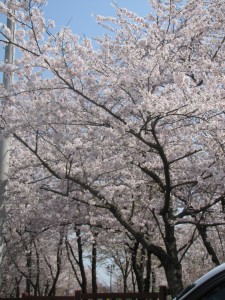
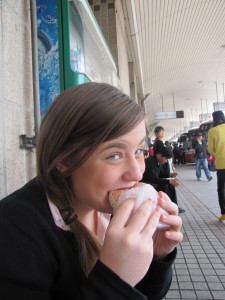
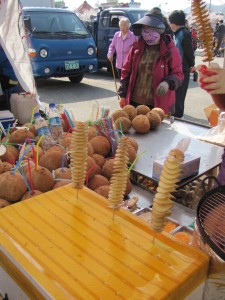
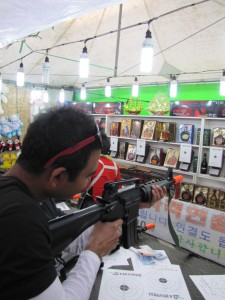
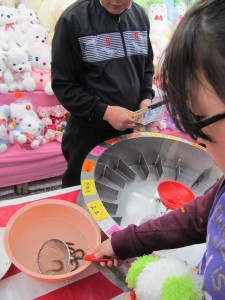
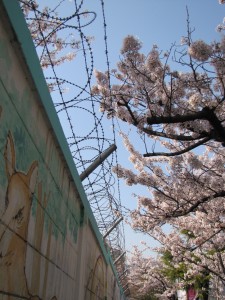
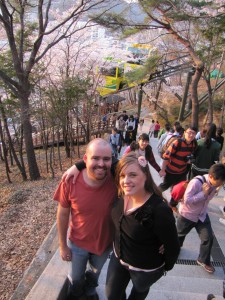
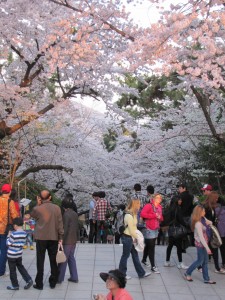
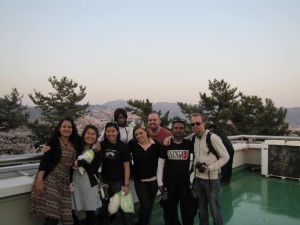
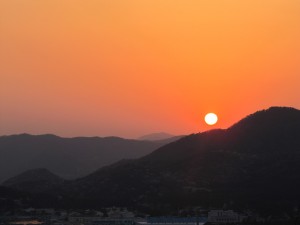
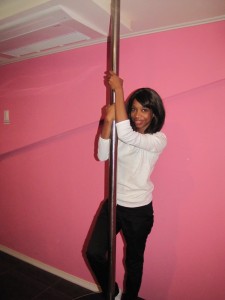
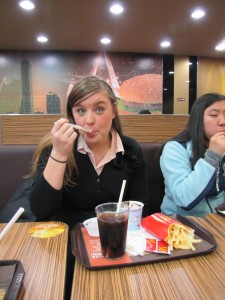
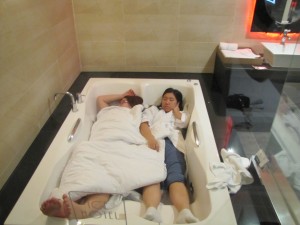


Recent comments